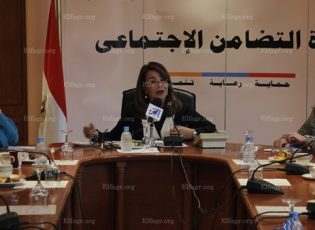The New Bay
April 15, 2017
When "Hassan" wanted to start a new real estate project in Egypt without paying bribes, employees in the local administration threatened to stop the procedures, but went as far as saying that the plot of land on which he wanted to build is archaeological treasures, and the man could only submit to their requests. The preference for using a pseudonym "Every action costs money".
Corruption is a scourge that Egyptians face daily, and it is rare that they do not have to pay bribes in government departments to obtain official papers or permits, and they are also accustomed to putting money in the hands of the policeman to escape from traffic violations, a situation which in some cases is due to the low salaries to a large degree as they reach Sometimes 1200 pounds (about 60 dollars), which is the minimum wage for employees in Egypt, but the phenomenon of corruption also exists at the highest levels, according to Al-Araby Al-Jadeed.
The protest against corruption was one of the reasons why millions of Egyptians took to the streets in 2011 and the overthrow of "Hosni Mubarak", who was accused of profiting himself and his sons from rampant corruption.
"Hassan" believes that since the revolution against Mubarak, nothing "except the faces" has changed.
Reforms awaiting
Despite this, several corruption cases received great media attention, and were finally transferred to the judiciary. Since he came to power after he ousted the elected president, "Mohamed Morsi" in 2013, President "Abdel Fattah El-Sisi" has been stressing that fighting corruption is one of his priorities, stressing However, "no one is above the law."
In April 2016, a former Minister of Agriculture was sentenced to 10 years in prison for receiving a bribe.
Almost every week, the Administrative Control Authority announces the arrest of two employees accused of corruption, including two employees of the Ministry of Endowments who were arrested last January on charges of receiving bribes in the process of selling lands.
A judge in the State Council committed suicide last January after he was arrested in a financial corruption case, and the Administrative Control Authority rejected the requests of the Agence France-Presse agency.» To conduct interviews with its officials.
And acknowledges «the loyalty of Jad al-Karim»; He is an official at the NGO Partners for Transparency Organization that "the political rhetoric is very strong with regard to corruption, as the president always talks about that." However, he adds, "However, this should be reflected more quickly in legislation."
Experts are calling for reforms related to freedom of access to information, protection of whistleblowers, independence of oversight bodies, and a greater role for civil society.
Pending these reforms, Egypt lost two points in 2016 compared to 2015 on Transparency International's corruption scale, which measures perceptions of corruption in the government sector.
Kinda Hattar, advisor to the Middle East and North Africa Department at Transparency International, says that this decline is due to "restrictions imposed on civil society and government oversight agencies with regard to talking about corruption."
These are restrictions revealed by the case of "Hisham Geneina", the former head of the Central Auditing Organization. After "Geneina" made press statements about the extent of corruption in the country, he was dismissed from his position and sentenced to a year in prison with a suspended sentence, as he was accused of spreading false news that included "inflating" the cost Corruption.
“Geneina” said at the end of 2015 that the cost of corruption in the government sector amounted to 600 billion pounds (more than 60 billion dollars according to the exchange rate at the time), based on the sum of the estimates contained in the reports prepared by the Central Auditing Organization between 2012 and 2015.
Usama Diab, a researcher at the Egyptian Initiative for Personal Rights, a non-governmental organization, says, "Geneina crossed a very important red line, as the independence granted to the CAO was always conditional on the data and numbers obtained by them remaining confidential."
As for the impact of corruption on Egyptians, it takes many forms. Hattar points out that "Egypt is known for the collapse of buildings over the heads of its inhabitants because of the building's violation of technical conditions."
She explains that manipulative contractors do not hesitate to pay bribes to employees to buy their silence on building violations, and there is another common image of corruption. After "Dania" paid a fine of 500 pounds (about $ 27) because she was driving her car with an expired driver's license, she received valuable advice from One of the officers: "If you had given 50 pounds (about $ 2.7) to the policeman at that moment, you would not have had to pay the fine."













